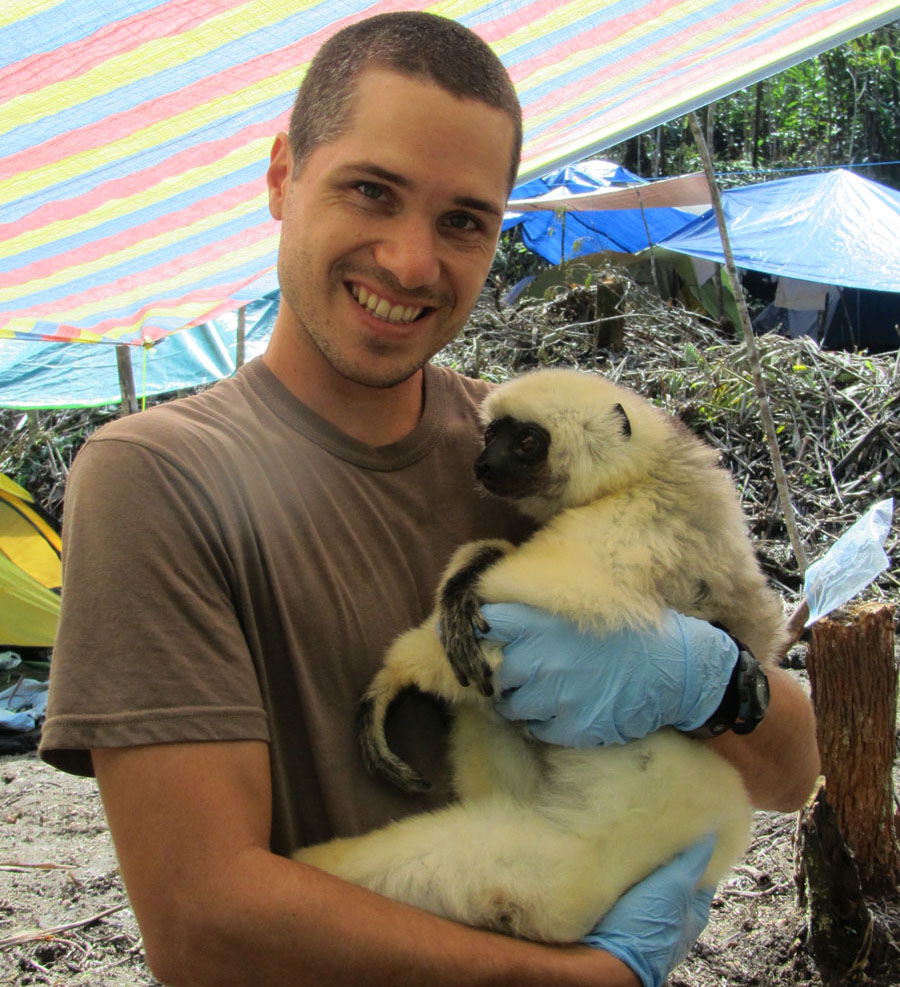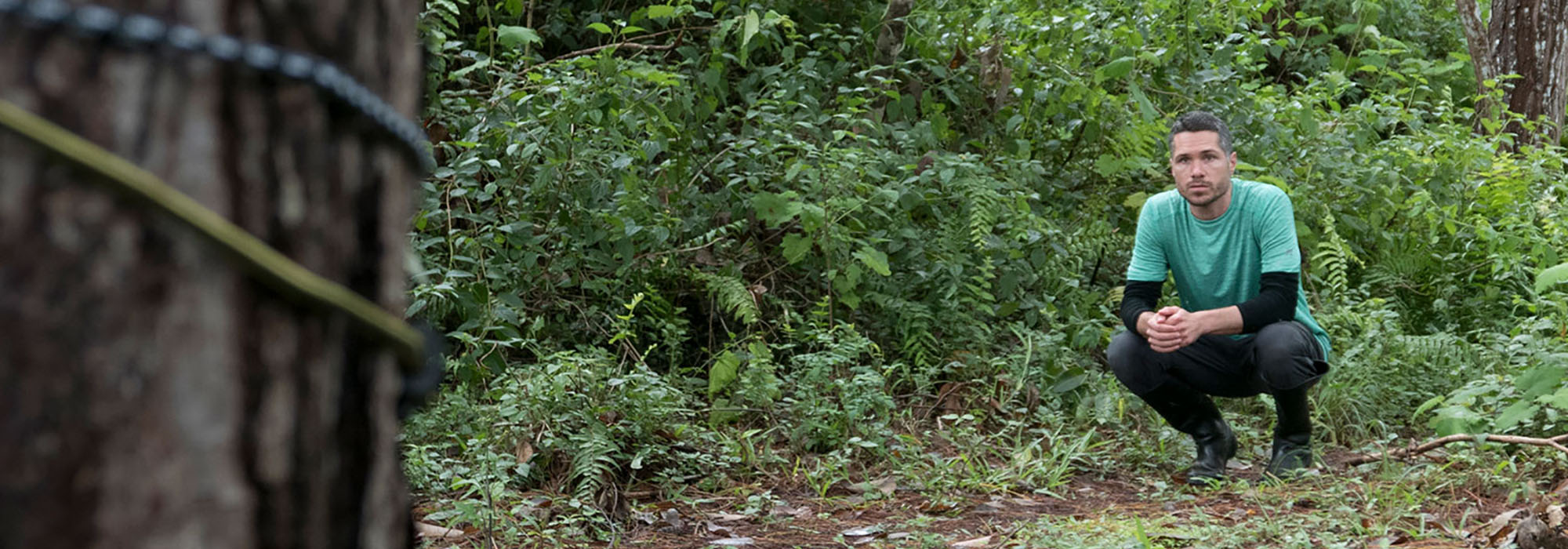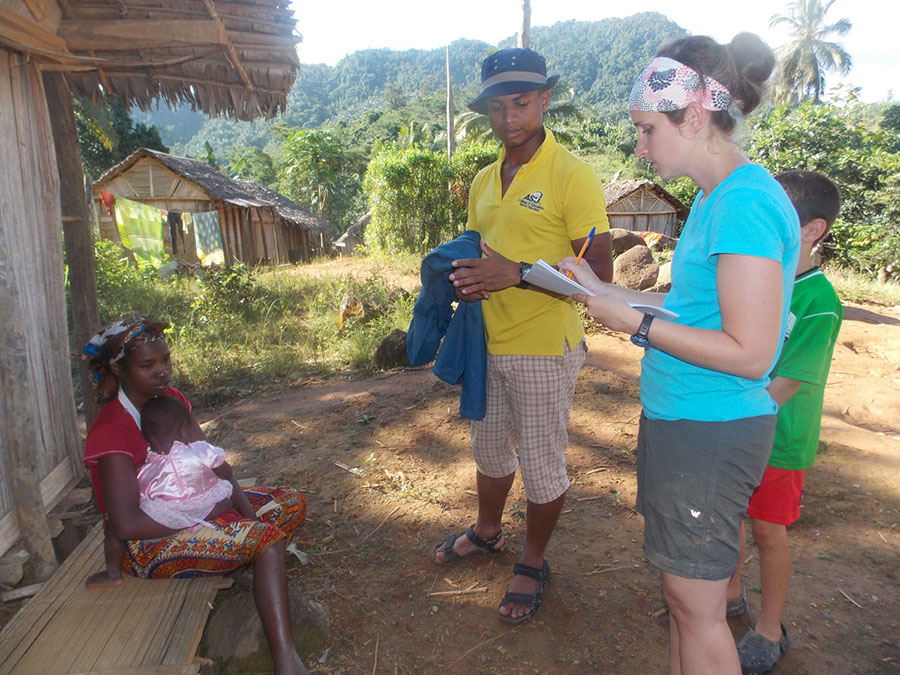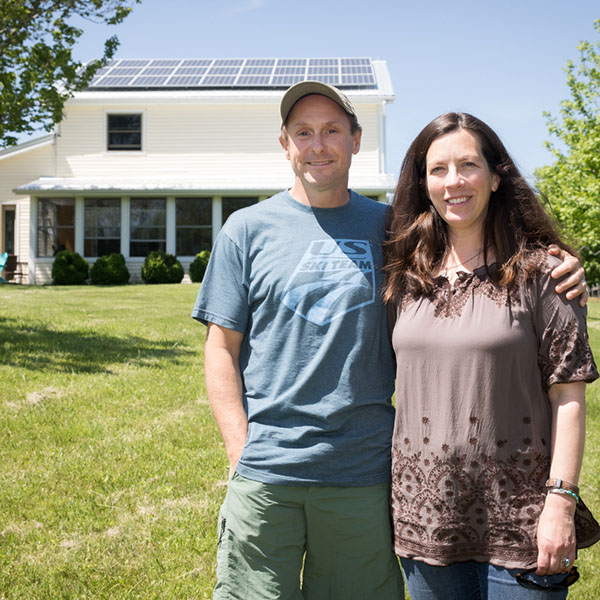Dr. Zach Farris was a country boy pursuing a degree in biology at the University of Central Arkansas when he picked up an encyclopedia of mammals and opened to a picture of an aye-aye. Something about the furry animal, which is found only in Madagascar, captivated him.
“I learned that there were very few of them left,” he said. “I decided that I wanted to be an aye-aye biologist.”
Finding his passion set Farris, a visiting assistant professor in the Department of Health and Exercise Science at Appalachian State University, on a journey that would take him deep into the jungles of Madagascar. Ultimately his wife, also an assistant professor within Appalachian's Beaver College of Health Sciences, would become engaged in community research around food issues that impact the Malagasy people.
Protecting ayes-ayes and ecosystems
Madagascar’s aye-ayes evolved in isolation over the last 200 million years and are found nowhere else on earth, Zach Farris said. When he arrived in Madagascar 15 years ago, they were dying off in the national parks that had been established to protect them. No one knew why.
That was a problem because the ecosystems that the animals in the protected areas were part of provided the clean water, wood and other resources that supported the Malagasy people’s livelihoods. As explained by the World Wildlife Fund, “When you remove one element from a fragile ecosystem, it has far-reaching and long-lasting effects on biodiversity.”
Zach Farris’ research over the next 10 years led to the discovery that domestic and feral dogs and cats were killing the native species as prey, driving them out of protected natural areas and spreading diseases and parasites. The people couldn’t afford to spay, neuter or vaccinate their dogs and cats and there were few veterinarians in the country to perform such services.
Rather than depend on private or government solutions, Zach Farris and some of his colleagues founded the Mad Dog Initiative, a non-profit that provides veterinary services to pets for free and flies veterinarians to Canada for training.
“There’s been a huge positive acceptance of our program,” he said. “We’re all about helping the native species, but on top of that we were very concerned about the native people.”
Zach Farris has been interviewed by the BBC about his research, with an air date coming soon.

Appalachian’s Dr. Zach Farris holds a sifaka, one of Madagascar’s endangered mammals. The sifaka has been captured so scientists can put a radio collar on it to study its behavior in Makira Natural Park. Farris is a visiting assistant professor in the Department of Health and Exercise Science. Submitted photo
Combatting malnutrition and food insecurities
Alisha Farris is also concerned about the native people. She is an assistant professor in Appalachian’s Department of Nutrition and Health Care Management. She and their sons followed Zach Farris to Madagascar while he worked on his doctoral dissertation from Virginia Tech. She had long been interested in maternal and child nutrition, and she began to think about the possibilities for doing a community-based health project there.
Back in the states, Alisha Farris earned her doctorate in behavioral and community nutrition, also from Virginia Tech. She returned to Madagascar with her husband during the summers of 2015 and 2017.
She conducted research on how far Malagasy people travel to reach food markets, how they get there and whether they can afford nutritious food. She also recorded the heights and weights of villagers. That data will form the basis of a community-based plan to improve malnutrition and food insecurity. Such studies are valuable in the Appalachian classroom and give her students real-world examples of a community nutrition assessment, she said.
Next summer the couple hopes to incorporate Appalachian students into a study abroad program. The simplicity of life in the Madagascar villages where the Farrises work can provide students with a quick understanding of the complex factors that interact to create conservation and health crises.
“It’s hard for students to make the connection that my work can be related to Zach’s work until they’re in Madagascar,” Alisha Farris said. “When it comes to nutrition and health and sustainability, all of those things are connected in a big messy problem that can’t be solved in a silo. They have to be solved by all of us working together.
“I’ve partnered with a lot of the same organizations that Zach partners with. They understand that without having a healthy community, their conservation efforts aren’t going to be realized. People are going to go into those areas that Zach is trying to protect and strip them of natural resources. They’ll eat the mammals and cut down the trees.”
Recognizing the interconnectedness
Bringing many viewpoints to bear on a problem is something she believes in, whether in Malagasy villages or her classroom.
“I try to set up my classes so everyone feels very valued and comfortable speaking,” she said. “I’m bringing my experience. I feel like students are bringing their own experiences to the classroom as well.”
Though nearly 10,000 miles separate Boone from Madagascar, what happens there matters here, Zach Farris said. That may be the most valuable lesson he can offer students.
“Deforestation in Madagascar is going to have consequences for the rest of us here,” he said. “In southern Madagascar, we’ve seen the collapse of some ecosystems and the most intense food famines we’ve seen in Africa. Our tax dollars are going to try and address this problem. Our service workers are going to those areas. Had we been involved before, that might not have happened.”
What do you think?
Share your feedback on this story.
Meet some Mountaineers who are living intentional lives, and making a difference for others.
About the Department of Nutrition and Health Care Management
The Department of Nutrition and Health Care Management in Appalachian State University’s Beaver College of Health Sciences provides graduate and undergraduate programs. The undergraduate health care management program prepares students for entry-level management positions, while the online Master of Health Administration degree is designed for working professionals who desire to advance their careers. The undergraduate nutrition and foods program prepares students for careers in dietetics or food systems management in a variety of settings, including schools, hospitals, nursing homes and food banks. The highly competitive master’s degree in nutrition provides a pathway for students to become registered dietitians. Learn more at https://nhm.appstate.edu.
About the Beaver College of Health Sciences
Appalachian State University’s Beaver College of Health Sciences (BCHS), opened in 2010, is transforming the health and quality of life for the communities it serves through interprofessional collaboration and innovation in teaching, scholarship, service and clinical outreach. The college enrolls more than 3,600 students and offers 10 undergraduate degree programs, nine graduate degree programs and four certificates across seven departments: Kinesiology, Nursing, Nutrition and Health Care Management, Public Health, Recreation Management and Physical Education, Rehabilitation Sciences, and Social Work. The college’s academic programs are located in the Holmes Convocation Center on App State’s main campus and the Levine Hall of Health Sciences, a state-of-the-art, 203,000-square-foot facility that is the cornerstone of Boone’s Wellness District. In addition, the college supports the Appalachian Institute for Health and Wellness and has collaborative partnerships with the Wake Forest University School of Medicine’s Physician Assistant Program, UNC Health Appalachian and numerous other health agencies. Learn more at https://healthsciences.appstate.edu.
About Appalachian State University
As a premier public institution, Appalachian State University prepares students to lead purposeful lives. App State is one of 17 campuses in the University of North Carolina System, with a national reputation for innovative teaching and opening access to a high-quality, cost-effective education. The university enrolls more than 21,000 students, has a low student-to-faculty ratio and offers more than 150 undergraduate and 80 graduate majors at its Boone and Hickory campuses and through App State Online. Learn more at https://www.appstate.edu.






![How NCInnovation Is Rethinking Economic Development in North Carolina [faculty featured]](/_images/_posts/2026/02/rethinking-economic-development-600x400.jpg)







